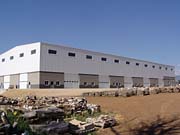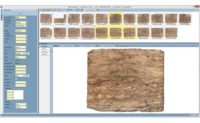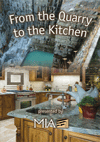
Since his early teens, when he worked for a stonemason contractor, Robert Hicken has been involved with natural stone. And although his lineage is not connected to the stone industry, he quickly became enamored with the craft. Today, with partner Paul Ballif, he owns and operates Delta Stone Products in Heber City, UT, which is supported by an affiliated quarry (Mountain Valley Stone), a stonemasonry business (R.J. Enterprises) and two fabrication shops.
"When I was 14, I started in the masonry trade," Hicken explained. "I worked for a few stonemason contractors, and from there I learned the trade as far as stonemasonry goes. In 1988, I decided I wanted to go on my own, and that's when RJ Enterprises started. I started out with just one employee, and our first stone yard was in the back of my grandfather's corral in one of his sheds. Each year, we've grown into what we have now. We currently have about 125 employees."
Six years after setting out on his own, he met his eventual partner while taking college courses in Utah. "In 1994, I was going to college and I met Paul Ballif," he said. "We were both in the construction management program at Brigham Young University, and at that point we started to work together. At that time, we were at 30 employees, and our main focus at that time was masonry -- fireplaces, stone veneers, stone chimneys -- all from the installation side.
"Through the years, we continued to grow, and in 1998, Paul became a partner. Shortly thereafter, we reorganized and started what we called Mountain Valley Stone, which is the quarry division," Hicken continued. "The main reason for starting that was we felt there was a big need for Utah sandstone, and there wasn't anyone quarrying stone 365 days a year. We had some problems with the previous quarries being able to produce enough stone just to finish our local jobs. We would spend weekends at their quarry, just quarrying the stone ourselves for our own projects."
Today, the company has between 20 and 25 workers in the quarrying division, and they sell stone throughout the U.S. "The quarry had been [active] on and off for 50 years. We went in and reorganized the quarry with the existing operators," Hicken explained. "That lasted about three months, and we ended up offering for him to buy us out, but he didn't want to. So eventually we bought him out."
"The problem we had was that the original quarry operated at a maximum production of 15 tons of material per day, and it was limited to two or three types of products," Ballif said. "It was basically a flagging quarry, and it didn't have much availability. We wanted to be able to produce multiple products that we could use in our own company and maybe sell. It was a desire to produce for our masonry side, and then we hoped that other masons would want to purchase material from us. There are other quarries out there, but none of them could do it. We put a lot of the manpower in, and we went from two people in the quarry to 25 employees within the first year."
With the increased work force, Mountain Valley Stone not only increased capacity, but also the product line. "We went from two to three products up to 20 products out of the same stone," Ballif said. "There are more classifications of flagging; classifications of building stone; the landscape market; different styles of flags; rough-cut; tumbled and so on. We started to service customers and clients according to their needs."
Equipment in the quarry includes three track hoes, a Komatsu and two Caterpillars. The stone lies in the quarry on a 30-degree angle, and the workers pull out boulders and slabs with the track hoes and move them to different areas as needed. "Blasting is very, very limited," Hicken said. "We try not to blast at all if possible so as to no hurt the integrity of the stone."
"We also hand drill all of our blocks," Ballif said. "We plug and feather them down, and everything is hand split with a hammer and a chisel." The blocks range in size from 1,000 to 50,000 pounds, although the largest blocks are typically broken down to make them more manageable. "What we generally do [for building stone] is to take the best blocks possible -- 4 x 6 x 8 feet," Hicken said. "But since they're formed by nature, they don't come out like that. We have been able to make it work." The company eventually plans to purchase a wire saw for the quarry to produce master quarry blocks based on industry standards.
Approximately 80% of the quarried stone is shipped out of state, with the remainder used on local projects in Utah.
In 2000, Hicken and Ballif established Delta Stone Products, which currently sits on 25 acres of land in Heber City. "It was created primarily to manage R.J. Enterprises -- to bring inventory in and stock it," Hicken said. "But Delta Stone has evolved into a full retail supplier for veneers and cut stone."
Stone fabrication
The company's first saw shop was started in 2001, and it was equipped with a 36-inch Jaguar bridge saw from Park Industries of St. Cloud, MN, as the primary piece of equipment. The shop is 5,000 square feet in size, and cutting is also done with a 24-inch, dual-head conveyor belt saw from Sawing Systems of Knoxville, TN. This shop is also equipped with a Wizard workstation from Park Industries. This radial arm machine serves as both a face polisher as well as an edge shaper."We were running into the same problems with [getting people to cut] masonry that we were with the quarries," Ballif said. "We weren't getting stone in the times that we needed it. A lot of the cut shops weren't serving us the way we wanted, and so we were using hand equipment and cutting it ourselves. Once we got into our new yard, we purchased the Jaguar from Park, and that was our kickoff into fabrication. For the first year, 90% of what we did was for R.J. Enterprises, our own masonry business. Slowly, other masons saw what we could do, and we built up a clientele that was asking for more and more material."
Growth continued rapidly, and the company eventually had to expand its fabrication capacity. "The original building was 60 x 80 feet," Ballif said. "We filled that with equipment, and then we needed a saw that could take larger block material. So two years after we installed the bridge saw, we started looking at a block saw operations, and [we considered] what that would do for us. We investigated and we traveled around to companies like Cold Spring, TexaStone Quarries and a few other companies who had big saws."
In order to house the large-scale saw they desired, Hicken and Ballif had to construct yet another new building. "We needed to build the right facility for the saw, and one that would also allow for continued growth," Ballif said. "It seemed like every time we built a building, we grew out of it, and this is why we studied this longer. It took two years to come up with the size of a building that we thought we could use for the next five to six years and also give us room for growth, which is very important for us. We didn't want to outgrow it and move again."
The new 30,000-square-foot facility has a sophisticated water recycling system that accommodates the land where the building is located. "The ground here percolates, and you can lose 10,000 gallons of water in a day without it ever coming to a surface," Ballif said. "We had to build a tank to recycle the water. It is a 200,000-gallon tank made out of concrete that contains the water to the point that we have very little water waste -- a little to evaporation, but that's about it. We can recycle the water and be environmentally conscious. With the pumps it has running, it can pump 1,000 gallons at 80 psi or 2,000 at 60 psi, so we have more than what we need and can grow. All the drainage was planned in the beginning, so we wouldn't have to cut the floors or add anything as we grow."
To build its newest facility, the owners acquired a contractors license and served as the general contractor on the building. "We knew how it would be used for years to come," Hicken said. "Everything internally is all galvanized -- all the steel columns. So there is zero maintenance for the next 50 to 100 years. As we continue to master plan the shop with more inline saws, polishers, edgers and guillotines, we wanted to make sure that we didn't have down production time because of maintenance issues."
The main piece of equipment in the new facility is an Eagle II block saw from Park Industries, which features an 11 1/2-foot-diameter blade. The owners said they chose the saw because of its features as well as the level of service they have received from Park Industries. The variety of stone processed by the company also motivated their choice for a large block saw. "The variable speed of the Eagle II allows us to go from sandstone to limestone to granite without a major tooling change," Ballif said. "It's the same blade for all the stone, and we just adjust the speed. We can program the saw to go down the line and change speeds at each block. The saw runs on 120 feet of rails, and we could actually put three saws on that same rail." Stone is transported in the new facility with a 40-ton overhead crane from American Equipment.
The fact that the shop is one-of-a-kind was a bit of an obstacle for the owners. "One challenge is that there isn't another shop in the state like it," Ballif said. "There are smaller ones with wire saws and older equipment, but nothing like this. So to be able to bring something into this area and make it profitable and justify it [was a challenge.] Our justification was the quarry. We're looking for other local quarries where we could bring different products into the market. There are five or six quarries close by that we could buy from."
And in addition to Utah sandstone, the shop processes a variety of materials from around the country. "We knew we couldn't just cut our own stone," Hicken said. "We are also a cut shop for hire. We will buy anything from limestone to soapstone to granite and sell it to the finished market. I don't think we've ever tried to just promote our own stone. We want to promote our company, service and expertise as a full turnkey masonry shop."
With the new equipment in place, the owners also have a clear plan for future expansion. "We also have a Phase Two that is designed and engineered and ready to build," Hicken said. "This will include more growth and expansion to have more capacity for the U.S. market -- such as a tile line. Our ultimate goal is to do commercial and government cladding as well as religious buildings and carved stone."
To maintain a solid workforce, the company recently created RMD Management to give all the employees a full range of benefits, including health insurance, 401K and cafeteria plans. Since many of the employees are immigrants, the management also helps new workers get acclimated into the U.S., purchase homes, adjust to taxes and deal with other issues.
As for training the workers, the company provides continual guidance, and they have a number of workers who have been with them for the long term, including Hicken's brother, Aaron. "We have had good key people who wanted to learn and grow, and also a good manager in the quarry," Ballif said. "They all have the training and dedication to get things done. Aaron has been with us in the shop from the beginning. Getting a new person to do things the way we would like to do them isn't always easy, especially in an area where there isn't anything like this around. We push our equipment to do things. With the Jaguar saw, we've had Park say that no one is doing things like this with that saw."
Marketing
Before marketing themselves to the industry, Delta Stone Products wanted to make sure that they could deliver quality products on time and on a consistent basis. "One of the goals of the company was not to advertise until we had 500 tons of material on the ground," Ballif said. "We didn't want customers to run in to the same problems that we had in the beginning. We've based everything on what we've experienced [on the purchasing side], and that pushed us in a different direction. We actually install the same material that we pull out. We're worried about how everything will look at the end of the day when it's all said and done."The relatively young age of the principals has been at once a blessing and an obstacle. With a fresh approach to the business, Hicken and Ballif are taking technology into the future, and they are willing to take chances and try new things. On the other hand, they are first generation quarriers, masons and suppliers in a business that is traditionally passed on from generation to generation. "Our parents weren't in this business," Hicken said. "But if you look at the way we've grown and the respect we've gotten, our service and our desire to help has served us well."
The company's production total is approximately 20,000 tons of material per year, including flagstone as well as all architectural products. "We have 320 productive days in the quarry per year," Ballif said. "There are maybe five days of quarrying canceled due to weather. For four months, the stone is heated so it could be split properly. We are in full production in the winter. We place a tarp over the stone and place burners inside. We don't charge an upgrade for stone quarried during the winter, since we figure it maintains our inventory. Other quarries may shut down or maybe supply an inferior product because they don't split the stone. We can't afford to produce a different product in the winter than we do in the summer."
A key focus for the company is its Delgado Stone line, which is thin veneer cut into 1- to 1 1/2-inch thickness to install as a veneer when space, engineering and cost become an issue. According to the company, the thin stone market is taking off in the U.S. as a solution for people who want real stone, but do not have the ability to use a full stone application.
Another area of focus for the fabrication facility is stone cladding for exterior or interior building applications. This includes slab material as well as custom architectural stone products, such as window surrounds, arches, coping, fireplace mantels and other applications. Commercial and residential projects have included the following: Glenwild, a Tom Fazio Golf Resort; the Stein Eriksen Lodge at Deer Valley; Club Regent at The Canyons; Deer Crest Gondola; The Lodges at Deer Valley; The Colony at White Pine Canyon; Snowbasin Olympic Lodge; Elkridge by Bob Kelez; and Glacier Ridge by Steve Lukzak. Additionally, the company is currently under contract or has recently completed hundreds of private residences in Utah.
To meet the needs of the market, company personnel have been specifically trained by the Traditional Building Stone Institute in the Historic Masonry Preservation processes, which has earned R.J. Enterprises, Inc. recognition as an accredited restoration and preservation specialist within Park City. As such, R.J. Enterprises, Inc. has been engaged to perform several stone restoration projects in Park City's Main Street district.
Delta Stone's growth has also caught the attention of their entire region in Utah. It is now one of the largest companies in Wasatch County, UT, and a grand opening for the fabrication facility in May of this year drew over 400 guests, including officials from the Salt Lake City Chamber of Commerce, the Heber City Mayor and City Council, Wasatch County Senators and the area's top contractors and architects. Utah Senator Beverley Evans praised Delta Stone Products as a "welcome addition for the future growth of Utah."
In the future, the owners of Delta Stone Products hope to see its market continue to grow in the U.S. and beyond. "We want to be a major player in the international and national market," Hicken said. "We look at companies like Cold Spring Granite or Vetter Stone, and we have a tremendous tradition to follow. We've only been doing this for 15 years, and we hope to reach that climax sooner than later."

